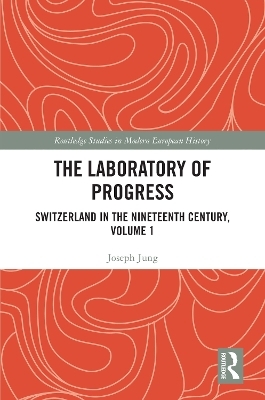
The Laboratory of Progress
Routledge (Verlag)
978-1-032-15226-4 (ISBN)
The Laboratory of Progress: Switzerland in the 19th Century tells the improbable story of how a small, backward, mountainous agricultural country with almost no raw materials became an industrial powerhouse, a hub of innovation, a touristic mecca and a pioneer in transportation – all in the course of a single century.
That a tiny landlocked country should become a dominant steamship builder for the rest of the world; that a country that had never seen a cotton plant should become the world’s second-largest textile producer; that a country with hardly any level terrain should come to boast the world’s most highly developed railway network; and that a country whose main export was impoverished emigrants should be transformed into one of the world’s major financial centres – these astonishing developments, among many others, are explored and explained, both through the specific stories of individual innovators and through a prescient analysis of the political, economic, societal and cultural structures that formed the context in which Switzerland’s astonishing transformation took place.
The book is a compelling read both for professional historians and for general readers with an interest in Switzerland; it highlights the roles of transport networks and individual pioneers in industrial and political development.
Joseph Jung is Professor Emeritus at the University of Fribourg and the author of bestselling biographies of the preeminent Swiss politician Alfred Escher and his daughter Lydia Welti-Escher, among many other works. He has received numerous awards for his pioneering research into 19th-century Swiss economic and cultural history.
1. The Discovery of the Mountains 1.1. A Terrible Beauty: The Alps 1.2. A Polyphonic Promotional Campaign: The Marketing of Switzerland 1.3. The Development of Tourism 1.4. Climbing and Hiking as Part of Elite Education 1.5. The Golden Age of Alpinism 1.6. Sightseeing in the Swiss Alps 1.7. 1865: The First Ascent of the Matterhorn 1.8. The Belle Epoque 1.9. Art and Commerce 2. New Beginnings: The Pull of the World 2.1. Forms and Phases of Emigration 2.2. Graubünden: The Best Confectioners in the World 2.3. Ticino: La Tristezza 2.4. Swabia: Child Slaves from Switzerland, Appraised Like Cattle 2.5. California: A Deceptive Eldorado 2.6. Zürichtal: The Catastrophic Trek to Crimea, 1804 2.7. Slavery in Brazil 2.8. The Long Way to New Orleans 2.9. Schaffhausen: Emigration Despite Industrialisation 2.10. Einsiedeln: Entrepreneurial and Cultural Expansion 2.11. Valais: Remaking Home on the Pampas 2.12. Exiled: The Eschers of Zurich 2.13. Ulrico Hoepli of Tuttwil: A Citizen of Switzerland and Italy 2.14. Heinrich and Christian Vögeli: The Modernisers of Serbia 2.15. Immigrant’s Son and President: Jacobo Arbenz of Andelfingen 2.16. An Argentinian Icon: Alfonsina Storni of Sala Capriasca 2.17. Josephine Gentinetta: A Goodbye Without Tears 2.18. Summary and Statistics
| Erscheinungsdatum | 05.07.2022 |
|---|---|
| Reihe/Serie | Routledge Studies in Modern European History |
| Übersetzer | Ashley Curtis |
| Zusatzinfo | 5 Tables, black and white; 5 Line drawings, black and white; 34 Halftones, black and white; 39 Illustrations, black and white |
| Verlagsort | London |
| Sprache | englisch |
| Maße | 152 x 229 mm |
| Gewicht | 453 g |
| Themenwelt | Geschichte ► Allgemeine Geschichte ► Neuzeit (bis 1918) |
| Geisteswissenschaften ► Geschichte ► Regional- / Ländergeschichte | |
| Geschichte ► Teilgebiete der Geschichte ► Kulturgeschichte | |
| Naturwissenschaften ► Geowissenschaften ► Geografie / Kartografie | |
| Wirtschaft ► Volkswirtschaftslehre ► Makroökonomie | |
| ISBN-10 | 1-032-15226-5 / 1032152265 |
| ISBN-13 | 978-1-032-15226-4 / 9781032152264 |
| Zustand | Neuware |
| Informationen gemäß Produktsicherheitsverordnung (GPSR) | |
| Haben Sie eine Frage zum Produkt? |
aus dem Bereich


